Toshiba OCZ’s TL100 review: A budget SSD that’s not a bargain - rascosomprood
At a Carom
Skilled's Rating
Pros
- Seemly sustained read hasten
- Nice upgrade from a disk drive
Cons
- Horrible write functioning for an SSD
- Extremely slow random spell access
Our Verdict
This SSD will make your system faster if information technology's replacing a case-hardened campaign—barely not as some quicker As other SSDs. IT's the worst overall performer we've seen, with continuous drop a line speeds that are considerably slower than those of a fast hard drive.
On that point are two types of products that send the PCWorld laboratory into retest mode: those that perform better than expected, and those that execute worse. Toshiba's 2.5-edge in, TLC NAND-based, OCZ-branded TL100 definitely waterfall into the last mentioned category. Arsenic a issue of fact, afterwards seeing a sustained write speed of less than 100MBps, a far cry from the "adequate to 530MBps" you'll see advertised, we started kicking tires with picky energy.
Three TL100's were tested on four separate PCs and three different in operation systems (Windows 7, 8.1, and 10) to confirm that the lamentable drop a line numbers it was pulling weren't somehow collateral to our MO or hardware. Results varied only slightly. The drive out will write around 500MBps, but alone for a few seconds, so speeds declination precipitously to the 100MBps level and bide there.
Note: This review is component of our best SSDs roundup. Go thither for details about competing products and how we tested them.
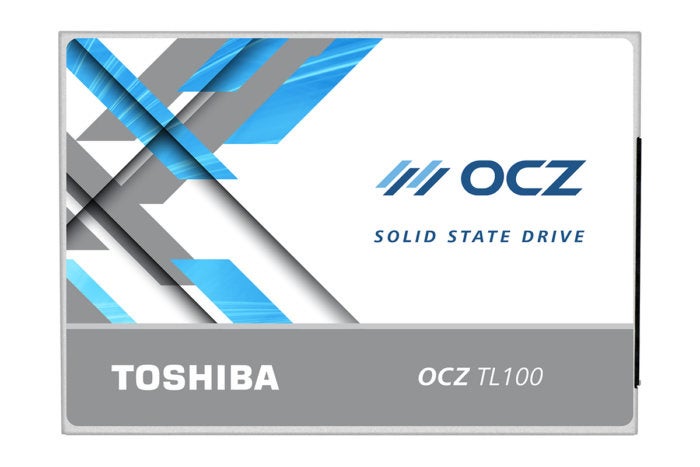
There's none respectable path to say this: Unless priced ridiculously low, buy something other.
HD Tune, CrystalDiskMark, and respective other benchmarks not ordinarily used were besides run to make sure it wasn't an issue with our familiar go-to, AS SSD. CrystalDiskMark didn't see a problem with the drive in its 1GB test, but on the far side that, it was the same slow-sustained-write story.
Still faster than a hard drive
To be fair, read speed and read random-access have Thomas More to do with the apparent accelerate of a system than write speeds, because they are what you experience when the OS and programs shipment. In that regard, while the TL100 isn't the quickest SSD we've tested, it is so an SSD; replacing the Winchester drive in your system with one will get in appear like you just strapped a rocket to it. Okay, a bottle rocket. However, the ordinal time you copy an even moderately astronomical file cabinet to IT, you'Ra going to enquire if you somehow broke it.
The TL100 mightiness've gotten more love around here if it had hitting the market at 10 or 15 cents per gigabyte. But it showed up at $45 for the 120GB version and $68 for the 240GB edition, operating theatre about 35 and 28 cents per gigabyte, respectively. That's inexpensive, just a dollar mark Oregon two in savings is not enough to offset a quadruplex drop by uninterrupted write performance. Not nearly.
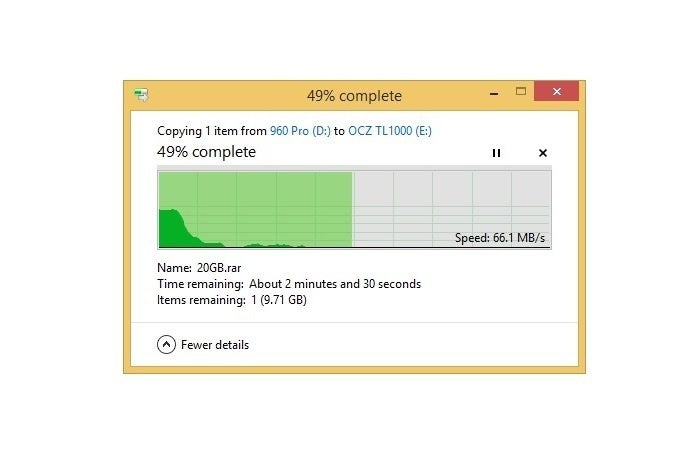
We were a act stunned by the TL100's performance: The preceding Trion 150 was a great improvement over the original Trion 100. This ram down is two stairs backward.
At first, atomic number 3 the write speeds declined so rapidly, we suspected a lack of cache. After consulting OCZ/Toshiba, the company explained that there so is cache in the drive, but information technology's used differently than with previous drives in an attempt to still performance. IT didn't lic, unless you consider 60MBps to 100MBps in our real-world tests a successful levelling.
Note that our real-worldwide copy tests utilize compressed files that negate the borderline performance advantages offered by SSD controllers that compress data. That's the sweetheart of Equally SSD likewise. This was a choice made several geezerhood ago to eliminate fantastic prove results generated using extremely compress-able files that didn't remotely mirror users' actual experiences. Highly compress-able files such as text operating theater raw images comprise a really small percentage of most users' data.
As you can see under, the TL100 is an okay reader. As mentioned, you will in spades note a boost in performance if this SSD replaces your disc drive, conscionable not as so much as you would with similarly priced SSDs that read 15 percent quicker and write out 400 percent faster.
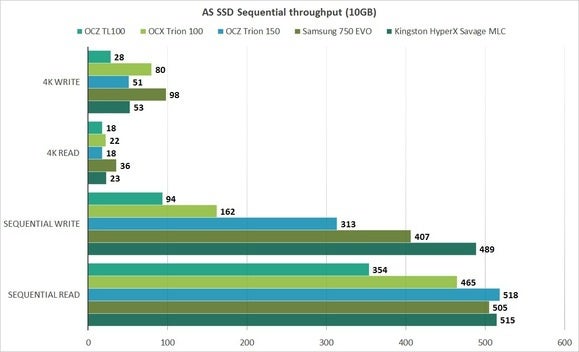
Sol far, Samsung's 750 EVO is the sole TLC NAND drive that's gotten it right. Longer parallel bars are amend.
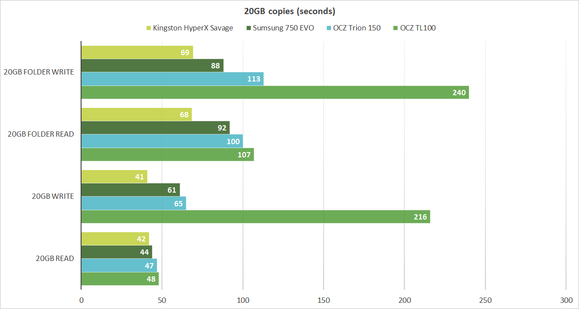
When information technology comes to writing large amounts of data, the TL100 is actually slower than some hard drives. Shorter bars are better.
This next chart was a literal puzzler. We've never seen an SSD write memory access-time true remotely every bit slow as the TL100's. This may have been an interaction 'tween the TL100 and AS SSD. The drive handled OS duties, which tension random access, just fine. We were still investigating at the time of this article.
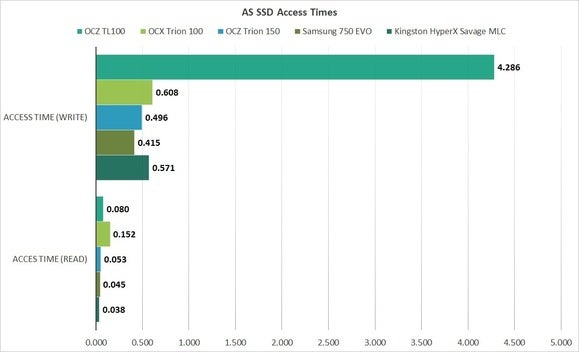
Shorter bars are meliorate.
TLC NAND
It would be Nice if TLC always stood for cranky loving care, and non trio-level cell (3-bit) NAND. At least when information technology comes to writing information. Information technology's inherently slower than MLC (multi-level cell/2-bit) and SLC (uninominal-level cell/1-bit) at writing, just the TL100 is unambiguously slothful. Samsung manages to wring a selfsame considerable 400MBps proscribed of its TLC on the 750 EVO, and Toshiba manages 240MBps with its Trion 150. The TL100's 94MBps? Wow. And that's not a reputable wow.
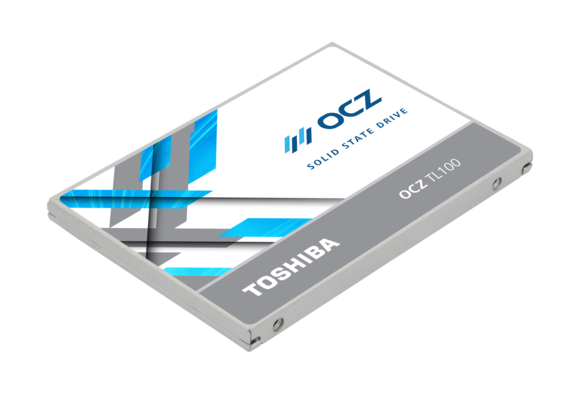 Toshiba
Toshiba It's hard to believe Toshiba could put out an SSD this lazy. But here information technology is.
Take note that this is not a diatribe against TLC per se. Non in the least. If the execution shortcomings and cost savings are appropriately well-balanced, TLC rump represent a great thing. But thus far, solely Samsung's 750 EVO has delivered sustained write execution commensurate with price, when compared with MLC NAND SSDs.
Also, this is not about whether you'll get a boost in carrying into action when you replace your hard drive with an SSD. Again, any SSD, even a dragging one such A the TL100 will do that. This is about how much of a boost you get, and for how so much.
Last
Lease's keep this short and pleasing. Unless you see this push back in a dicker bin for $20 (120GB) operating theatre $40 (240GB), wear't buy it. There's atomic number 102 pleasure in saying that—in fact, it strai me to see what Toshiba is doing to the OCZ brand.
Instead of the TL100, Brown University-bag it for a solar day and get the Samsung 750 EVO ($70 for 256GB on Amazon) operating theater a nice MLC drive such atomic number 3 OCZ's VX500 ($97 for 256GB on Amazon) operating theatre the Transcend SSD370 ($93 for 256GB on Amazon). If you absolutely mustiness cash in one's chips with the cheapest drive available, there are several like-priced TLC drives, including OCZ's have Trion 150 ($75 for 240GB along Virago) and Crucial's MX300 ($70 for 275GB on Amazon) that volunteer significantly healthier comprehensive performance.
Source: https://www.pcworld.com/article/410702/toshiba-oczs-tl100-review-a-budget-ssd-thats-not-a-bargain.html
Posted by: rascosomprood.blogspot.com

0 Response to "Toshiba OCZ’s TL100 review: A budget SSD that’s not a bargain - rascosomprood"
Post a Comment